What is KSDS?
From Paw Prints to Partnerships: The Journey of a KSDS Assistance Dog
At KSDS Assistance Dogs, Inc., we believe in building strong, lasting partnerships between people and dogs. Our process—from carefully planned breeding to advanced training and lifelong support—ensures that each dog is well-suited to meet the unique needs of its handler. Here’s a look at how it all comes together.
🐾 Step 1: Breeding and Birth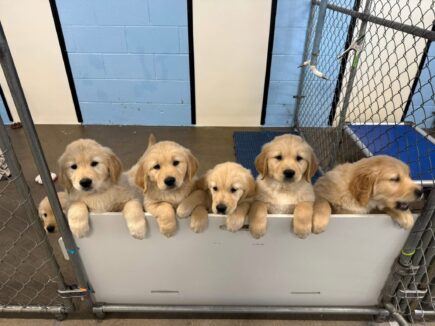
Most of our puppies are born on-site in Washington, Kansas as part of our carefully managed breeding program focused on Golden and Labrador Retrievers. As a proud member of the Assistance Dogs International Breeding Cooperatives (ABC/IBC), KSDS follows strict standards to ensure healthy genetics and temperament.
🐣 Step 2: Early Socialization
Newborn puppies begin life in a quiet area of our Canine Housing Unit (CHU), bonding with their mothers and littermates. Over the next six weeks, they experience:
-
Gentle handling by staff
-
Early sensory stimulation
-
Exposure to sounds like thunderstorms and street noise
-
Routine health checks, deworming, and vaccinations
At six weeks, the pups begin socializing with volunteers, including students from Kansas State University.
🏡 Step 3: Puppy Raising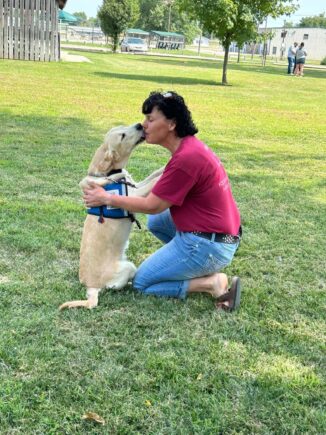
At eight weeks, puppies are placed with volunteer puppy raisers or into our Pooches and Pals program at the Topeka Correctional Facility. During this stage, puppies learn:
-
Basic obedience
-
Household manners
-
How to navigate community environments
This stage lasts until they are 18–20 months old.
🧪 Step 4: Health and Temperament Evaluation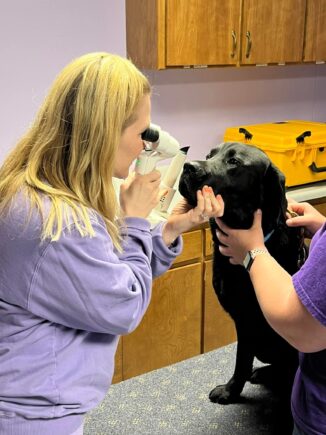
Before entering formal training, each dog undergoes extensive testing at the Veterinary Health Center at Kansas State University. Evaluations include:
-
Full physical exam
-
OFA radiographs (bone and joint health)
-
Certified eye exams (CERF)
-
Temperament assessments
Only dogs meeting all health and behavioral standards move on to advanced training.
🎓 Step 5: Advanced Training & Matching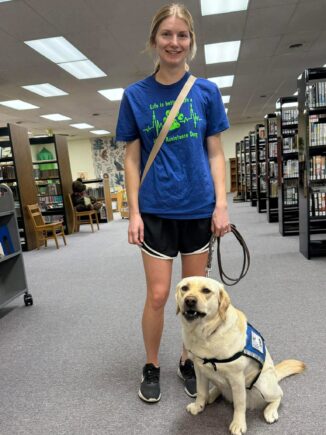
Dogs are trained for one of three specialized roles:
-
Guide Dogs for individuals with visual impairments
-
Service Dogs for mobility or medical alert needs
-
Facility Dogs to assist professionals in settings like schools or healthcare
Dogs are matched with applicants based on physical ability, personality, and lifestyle needs to ensure the most effective partnership.
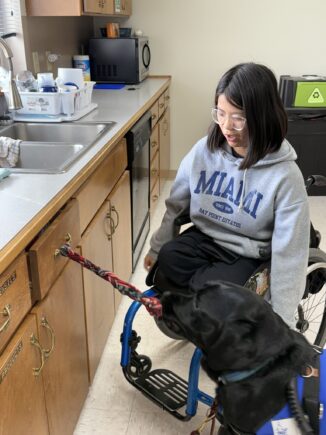 👫 Step 6: Team Training
👫 Step 6: Team Training
Once a match is made, the individual joins us on campus—or receives in-home training (for guide teams)—for 1 to 3 weeks. Training includes:
-
Hands-on practice giving commands
-
Learning public access skills
-
Bonding with their new canine partner
Applicants must demonstrate the ability to care for and effectively work with their dog. All students are housed in fully accessible apartments on campus.
Note: The cost of training and placement exceeds $25,000, but thanks to donor support, recipients pay no more than a $25 application fee.
💙 Step 7: Lifelong Support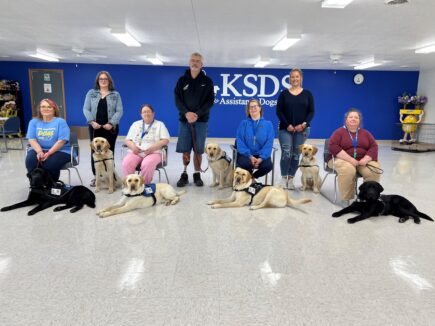
Graduates become part of the KSDS family. Our certified trainers provide:
-
Ongoing phone and in-person support
-
An annual Graduate Retreat
-
Troubleshooting and retraining as needed
KSDS remains committed to each team throughout the dog’s working life.
Why It Matters
With more than 650 assistance dog teams placed in 37 states, KSDS has been empowering independence, inclusion, and connection for 35 years—and counting. Every step of our process is rooted in compassion, professionalism, and a deep belief in the power of the human-canine bond.